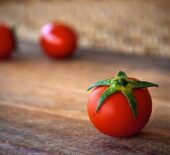A healthy gut is a key component to your health. Your gut barrier is one key component of your gut and plays many important roles. Your intestinal barrier is a complex barrier made up biological, physical, and chemical components. These components have many important roles such as ensuring any potential pathogens remain outside your gut wall as well as components like nutrients are allowed through. Your intestinal barrier also helps remove waste products as well as keeps the needed fluids and electrolytes within your gut cell wall.
There are many factors which influence the permeability of your gut. These include your genetics, stress, drugs, and diet. Diet is one component which can influence the permeability and function of your intestine barrier.
A typical Western Diet which is low in plant-based foods, low in dietary fibre, high in refined carbohydrates and unhealthy fats is linked to an unhealthy gut lining and barrier function. Specifically, a diet deficient in vitamin A, high in the added sugar fructose, emulsifiers, and alcohol as well as saturated fat.
The link between these diet trends and the health of your gut lining is due to factors such as lower levels of the health promoting short chain fatty acid called butyrate. Butyrate is a compound which has many positive health effects for your body including protecting and promoting an optimal gut barrier lining and function.
Research also links other important nutrients to gut lining health. This includes including enough wholefoods in your diet which provide you with adequate amounts of zinc, methionine, glutamine, polyphenols, vitamin D, probiotics, and polyphenols to promote optimal gut barrier lining and function.
Probiotics are live microorganisms, which in sufficient quantities, provide health benefits. Specific probiotic strains which are linked promoting your gut bacteria integrity and protecting from inflammatory factors includes, Bifidobacterium longum, Bifidobacterium lactis and Lactobacillus rhamnosus.
Polyphenols are compounds found in foods such as fruits, vegetables, wholegrains, herbs, spices, dark chocolate, and tea. These compounds can act like antioxidants and contain anti-inflammatory properties.
Glutamine and methionine are both amino acids. Methionine is an essential amino acid, meaning that your body cannot make it by itself, and you need to obtain it from the foods you eat. Good sources of foods which provide both these amino acids come from animal foods like dairy, lean meats, poultry, and seafood.
Vitamin D and vitamin A are both fat soluble vitamins. The best source of vitamin D comes from the sun but this vitamin can also be found in foods like egg yolk, dairy, seafood and fortified products. Vitamin A can be found in good amounts in egg yolk, seafood, dairy, and liver. Also, in plant foods in the form of beta-carotene, also called pro-vitamin A. Vegetables like sweet potato, carrots, spinach, or broccoli and fruits such as mango, and grapefruit are food sources of beta-carotene.
Zinc is a mineral found in foods like nuts, seeds, dairy, and animal meats and poultry as well as seafood. From the list of foods above which include nutrients linked to the health of your gut lining it is clear to see that eating a balanced and varied diet is a key factor. Not only will structuring your diet with a variety of whole foods support your gut lining but will also provide components which support the health of other important parts of your gut health such as your gut microbiome.
Take home message: There is no one single food or factor which is the key to your gut barrier functioning at its best. A lifestyle approach is key, and the right balance of diet components will help promote optimal gut barrier function.
References:
- Călinoiu LF, Vodnar DC. Whole Grains and Phenolic Acids: A Review on Bioactivity, Functionality, Health Benefits and Bioavailability. Nutrients. 2018 Nov 1;10(11):1615. doi: 10.3390/nu10111615. PMID: 30388881; PMCID: PMC6265897.
- Hill, C., Guarner, F., Reid, G. et al. The International Scientific Association for Probiotics and Prebiotics consensus statement on the scope and appropriate use of the term probiotic. Nat Rev Gastroenterol Hepatol 11, 506–514 (2014). https://doi.org/10.1038/nrgastro.2014.66
- Camilleri M, Vella A. What to do about the leaky gut. Gut. 2022; 71(2):424-435. doi: 10.1136/gutjnl-2021-325428.
- Quigley EMM. Leaky gut – concept or clinical entity? Curr Opin Gastroenterol. 2016; 32(2):74-79. doi: 10.1097/MOG.0000000000000243.
- Wyatt J, Vogelsang H, Hübl W, et al. Intestinal permeability and the prediction of relapse in Crohn’s disease. Lancet. 1993; 341(8858):1437-1439. doi: 10.1016/0140-6736(93)90882-h.
- Ikhtaire S, Sharif Shajib M, Reinisch W, et al. Fecal calprotectin: its scope and utility in the management of inflammatory bowel disease. J Gastroenterol. 2016; 51(5):434-446. doi: 10.1007/s00535-016-1182-4.
- Ajamian M, Steer D, Rosella G, et al. Serum zonulin as a marker of intestinal mucosal barrier function: may not be what it seems. PLOS ONE. 2019; 14(1):e0210728.
- Bron PA, Kleerebezem M, Brummer RJ, et al. Can probiotics modulate human disease by impacting intestinal barrier function? Br J Nutr. 2017; 117(1):93-107. doi: 10.1017/S0007114516004037.
- Sichetti M, De Marco S, Pagiotti R, et al. Anti-inflammatory effect of multistrain probiotic formulation (L. rhamnosus, B. lactis, and B. longum). Nutrition. 2018; 53:95-102. doi: 10.1016/j.nut.2018.02.005.
- de Vito R, Conte C, Traina G. A multi-strain probiotic formulation improves intestinal barrier function by the modulation of tight and adherent junction proteins. Cells. 2022; 11(16):2617. doi: 10.3390/cells11162617.
- Gut Microbiome for Health. In which circumstances is intestinal permeability increased and what can be done to improve it? www.gutmicrobiotaforhealth.com
.








